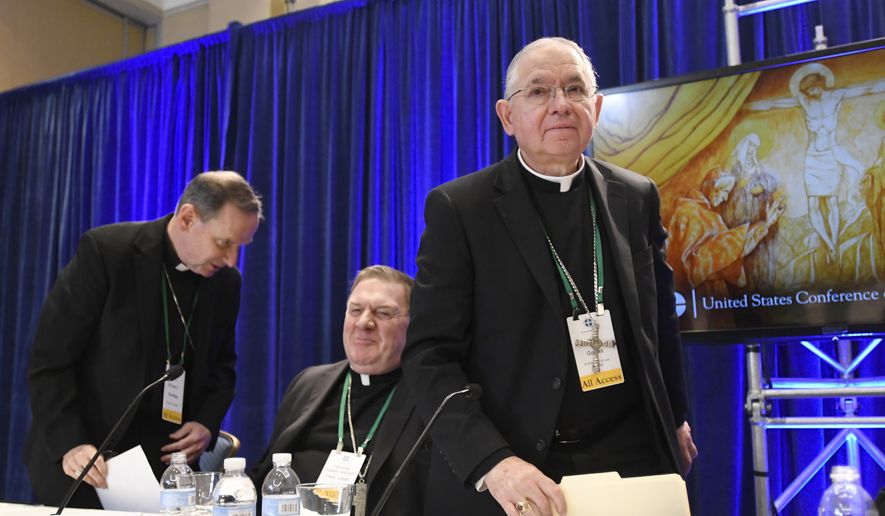The president of the U.S. Conference of Catholic Bishops issued Tuesday a statement about Joseph R. Biden, saying the presumptive election of the nation’s second Catholic president “presents certain opportunities but also certain challenges.”
Los Angeles Archbishop José H. Gomez also called for the formation of a working group to address any “confusion” about a faithful response to a Catholic politician backing public policy that goes against church teachings, such as abortion and same-sex marriage.
“This is a difficult and complex situation,” Archbishop Gomez said during the last day of the bishops’ annual two-day meeting. “We have reason to believe that he [Mr. Biden] will support some good policies … but we also have reason to believe that he will support policies” that undermine Catholic doctrine.
Archbishop Gomez, who was elected conference president last November, noted “unanimous support” from fellow bishops in making his surprise announcement during their virtual meeting. He noted Mr. Biden’s “good policies” on immigration reform, climate change and anti-racism initiatives, but specifically called out the former vice president’s proposal to repeal the Hyde Amendment, which prevents federal funding of abortions.
“We have long opposed these policies strongly and we will continues to do so,” the archbishop said. “But when politicians who profess the Catholic faith support them, there are additional problems. Among other things it creates confusion for the faithful about what the church actually teaches on these questions.”
Details about the working group were not released Tuesday.
Earlier Tuesday in a public-facing session, the bishops discussed racial unrest and the coronavirus pandemic, sometimes speaking personally about twin maladies that have rocked the church and the nation over the last year.
“I saw people kneeling in front of churches when we couldn’t open them” said Bishop Daniel Flores of Brownsville, Texas. “This is the renewal that I find very personally strengthening.”
Archbishop John Charles Wester of Santa Fe, Texas, who spoke of “angry” letters from parishioners about limiting access to the Eucharist, noted what he called a “double-edged sword” of opening up parishes to in-person worship during a pandemic.
“It’s kind of a perfect storm,” Archbishop Wester said. “What we really need at this time is to come together and pray tighter … what the virus really needs is for us to come together, to be together in large groups.”
Los Angeles Auxiliary Bishop Robert Barron called for a nationwide initiative to “bring someone back to church who has been away for a very long time.”
The conference also heard from fellow bishops representing sites of racial reckoning, such as Archbishop Mitchell Rozanski of St. Louis, who said Ferguson, Missouri, was “located just 20 minutes from our chancery.” He said a commission on peace and justice has held listening sessions and some parishes have worked to be “anti-racist.”
Archbishop Alexander Sample in Portland, Oregon, defended his city’s reputation, saying that rioting and looting “hijacked” coverage of the call for racial justice after the death of George Floyd in police custody in Minneapolis.
“I kept saying, ’Who remembers George Floyd anymore?’” Archbishop Sample said, adding that the unrest pushed him to learn more about “the experience of African Americans here in our own communities.”
Baltimore Archbishop William Lori spoke about being moved to write a letter in defense of the phrase “Black Lives Matter” in America magazine earlier this year.
“As ’Black Lives Matter’ signs began to appear all over town … I guess I was prodded, maybe kicked in the pants by the Holy Spirit to sit down and write an article in which I attempted to make a little contribution to the conversation by saying, ’Black lives matter,’ through the lens of Catholic social teaching,” Archbishop Lori said.
Tuesday’s meeting concluded the annual gathering of Catholic prelates normally held in Baltimore. This year’s session was held virtually, and normal voting rules were suspended.
On Monday, the bishops dealt with the recent Vatican report documenting the rise of disgraced cardinal Theodore E. McCarrick. That report received no mention Tuesday.
• Christopher Vondracek can be reached at cvondracek@washingtontimes.com.




Please read our comment policy before commenting.